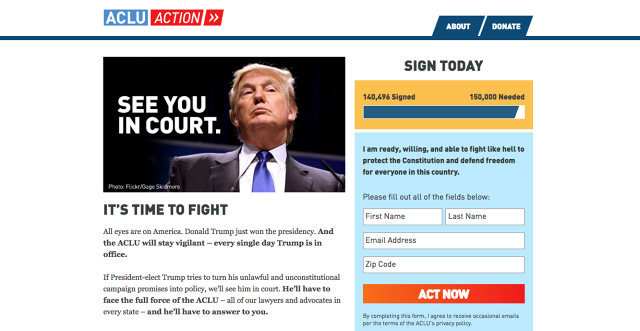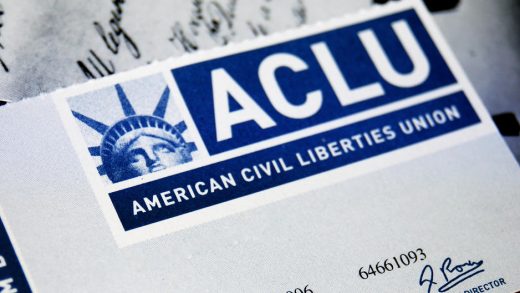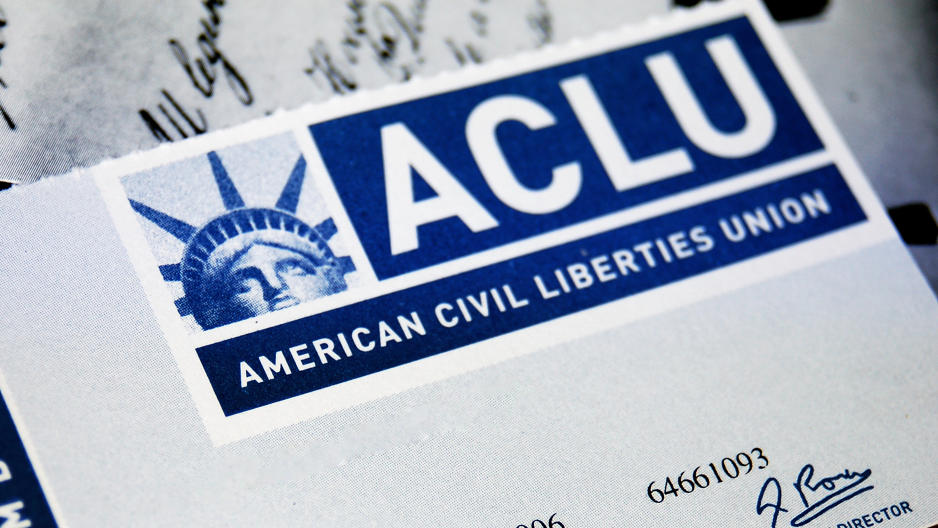How The ACLU Plans To Defend Rights After A Surge In Donations
The day after Donald Trump’s surprising electoral victory last week, the American Civil Liberties Union promised it would take the president-elect to court if he fulfills what the nonprofit called the “unlawful and unconstitutional” promises he made during his campaign. Since then, the group reported it had raised a record $7.2 million from some 120,000 individual donations, and added 150,000 new people to its email list—amounting to what it said was “the greatest outpouring of support for the ACLU in our nearly 100-year history, greater than the days after 9/11.”
“This is really quite different than the days I experienced after 9/11,” said the group’s executive director, Anthony Romero, who took the lead at the ACLU on September 4, 2001. “You saw the Patriot Act 30 days later. But there was not this outcry. Even at that time, liberals and progressives were not asking the tough questions. That’s different now. It’s different from the highest levels of government, to the media, to the rank-and-file people.” The Patriot Act gave U.S. law enforcement increased powers to conduct surveillance and to detain suspected terrorists.
During a phone call with donors on Monday, Romero emphasized that access to abortion could decline during a Trump administration, and he urged ACLU members to donate to the reproductive health nonprofit Planned Parenthood. Trump has said he would end federal funding to Planned Parenthood if it continues to offer abortions.
“This is the first time I’ve ever said this: You have to support us and you have to support [Planned Parenthood]. You have to write a second check,” Romero said. “This is a do-or-die moment. Because those clinics will close.”

Specifically, the 96-year-old nonprofit has criticized the president-elect’s promises to reauthorize the use of torture; to roll back some abortion rights; to create a dragnet force to deport millions of undocumented immigrants; to ban Muslims from entering the U.S.; and to “open up” libel laws to make it easier to sue media organizations.
The ACLU listed six short-term priorities in a statement on Monday.
In the coming weeks and months, the ACLU will be focusing our legal and advocacy strength on:
-protecting the ‘Dreamers’ who received presidential deferred action protection
-resisting any attempt to create a dragnet deportation force
-obstructing any effort to defund Planned Parenthood and other reproductive health service providers or deny reproductive rights
-preserving civil rights protections for transgender Americans
-preventing ‘stop-and-frisk’ policies from being adopted nationwide
-opposing any ban levied against Muslims for entry into the United States or discrimination against Muslims in the United States.
Romero added during the call that two of the ACLU’s immediate concerns are protecting the rights of protesters and reviewing the civil liberties records of the people Trump appoints to his new cabinet. Critics have worried about Trump’s appointment of Breitbart News chief Steve Bannon, who has been blamed for espousing a range of racist, misogynist, and Islamophobic views.
The organization is also brainstorming strategies to help members of the public get involved in these causes beyond simply donating, he said. “We heard from thousands of people offering to volunteer,” Romero said. “We’re trying to find a way to harness some of the volunteers.”
Romero pledged to put donations to use as quickly as possible. “I don’t believe it would be fair or judicious to bankroll the money,” he said. “This is going to be put out there right away.”
The group has also highlighted a surge in apparent hate crimes against Muslims during the campaign and in the days following the election. Such incidents rose 67% during 2015, according to new statistics released by the FBI on Sunday. “We can’t sit back and watch this become the new normal,” Heather Weaver, an ACLU attorney, wrote in a blog post.
The ACLU was founded in 1920 and relies on litigation, lobbying, and education efforts to fight civil rights abuses in the U.S. It currently has 1,100 employees and operates in all 50 states. In recent years, the ACLU has sued the Obama administration over its drone strike program, surveillance by the National Security Administration, and the detention of asylum seekers, among other issues.
Romero acknowledged that the unprecedented outpouring of support following Trump’s election has also brought new challenges to the organization. “With the level of interest from the public we’ve seen, we’re overwhelmed with how to reach out, engage, and deploy the public,” he said. “In order to meet this challenge, we’re really going to have to staff up.”
related video: John Legend On U.S. Prisons: “There’s Nobody Better At Locking People Up Than We Are”
Fast Company , Read Full Story
(29)














